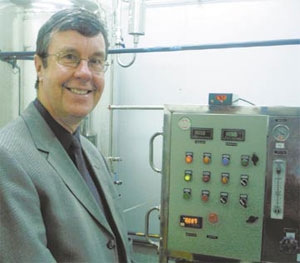China ties strengthened
MAYOR'S COLUMN
Mayor Garry Moore and the Christchurch delegation visited a number of technology and research organisations during their visit to Wuhan. The Mayor believes links between the two cities will be mutually beneficial.
Christchurch is doing business in the right way in China with the signing last month of a new level of co-operation with Wuhan, China's fourth-largest city.
Christchurch institutions and businesses are now operating around 20 memorandums of understandings with their counterparts in this bustling city, the centre of one of the fastest growing economic areas of China.
Last month I took a delegation from Canterbury of 18 people who have expertise in science, technology, horse racing and education to Wuhan. They further cemented the relationships built up over the past seven years, culminating with my signing of a formal Friendship Agreement with Wuhan's Mayor Xiansheng Li.
Mayor Li told us that his city is looking forward to cooperating with Christchurch on many fronts. "You are now our old friends and with this agreement you are our new relatives," he said.
Our proactive initiatives in fostering relationships with Wuhan are bearing fruit. We have done a lot of hard work and have built relationships. After the success of the groundwork, we can now progress and make things happen on economic and cultural fronts between the two cities.
What we have achieved has already earned praise from Chinese business and educational institution representatives, in addition to New Zealand trade officials based in China.
There was extensive news media coverage in China of our visit. Wuhan authorities proudly told their residents of the value of this link. Many of the residents we talked to, from the porters in our hotel to the staff at the botanic gardens, had read about Christchurch. Their perception was that Christchurch was an extremely beautiful city with much to offer Wuhan.
The best illustration of our recognition was when I spoke to English-speaking students at Huazhong University of Science and Technology. The students, armed with newspaper clippings and having read about Christchurch on the internet, came well prepared for my lecture.
Given that China is grappling with environmental problems such as air pollution, much of the students' focus was on Christchurch's clean green image. They wanted to know how I would tackle their city's air pollution and traffic congestion.
Everywhere we went it was obvious, that while Christchurch may be tiny by Chinese standards, it has much in common with Wuhan, one of three knowledge capitals of China.
Wuhan residents also love their parks and green spaces. In spite of the city's tremendous rates of growth and development, beautification is important.
They want our expertise, but after visiting the Wuhan Botanic Gardens and Chinese Academy of Sciences which boasts the world's largest collection of 66 kiwifruit species, we also have much to learn from them.
The 78ha gardens are not only beautiful, but they are a progressive centre for research and saving endangered species. After visiting the gardens, I am even more convinced of the obvious fit between science and our botanic gardens.
The Wuhan Gardens was just one of the pearls we discovered on our visit. Others included technology companies making giant strides in the fields of medicine, computer sciences and opto-electronics, universities which are knowledge powerhouses, and, on our final day, a fledgling horse-racing industry keen to tap into New Zealand's expertise.

Mayor of Christchurch

Mayor Garry Moore and the Christchurch delegation visited a number of technology and research organisations during their visit to Wuhan. The Mayor believes links between the two cities will be mutually beneficial.
|